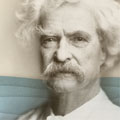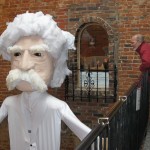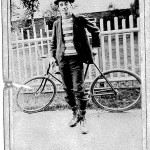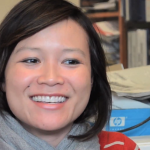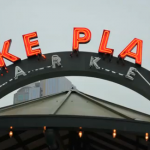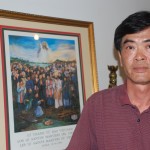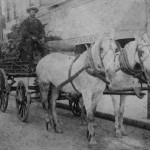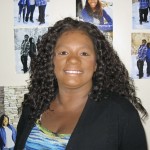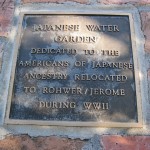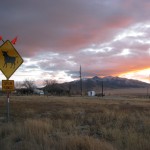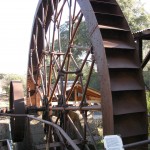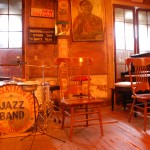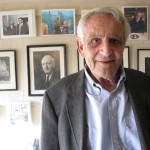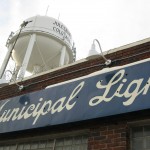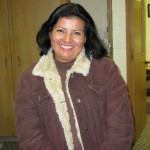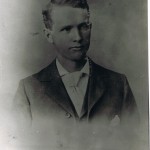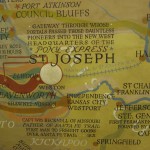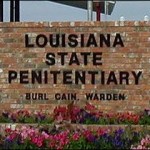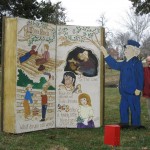The Saturday morning we went to see journalism professor Ed Alwood at Quinnipiac University, it happened to be parents’ weekend and the campus was abuzz with activity—music playing, lots of hand-drawn cardboard signs, mothers and fathers walking around with their kids.
We pulled up to the gate and rolled the window down to speak to the security guard. Loren managed a few words before the security guard held up a piece of white paper with, bizarrely, Loren’s headshot on it. She compared the image to the real thing, and then waved us through. A hundred feet later, another security guard stopped us. She held up the same photo, grinned, and pointed to the face on the piece of paper. We were VIPs.
Ed Alwood, like every good journalist, had done his homework on us.
Before entering academia, Alwood had a long career in journalism and public relations, including working as a CNN correspondent in Washington, D.C. He published Straight News: Gays, Lesbians, and the News Media—the first book to describe the experiences of gays and lesbians in mainstream media—which is why we went to see him.
Alwood, who is gay, has had a prime view of the gay rights movement, from the pre-1974 era when homosexuality was classified as a mental disease, to the first gay march in Washington D.C., to the current movement, which he questions.
Alwood finished college in 1972, when “gays were still mental cases.” he said. “I wasn’t out at work, whatever out is,” Alwood said. “How are you out at work? Bring in a banner? Oh, I didn’t have any boyfriends’ pictures at my desk.”
Being gay sometimes left Alwood feeling vulnerable on the job, but it also helped him find and air stories he otherwise wouldn’t.
It was sometime in the early ‘80s in Washington D.C. “I’d never been to the gay porno movie theater, but I knew where it was,” Alwood said. “In that day, the gay movie theater would advertise the movie it was showing in the Washington Post.” Alwood was riding in the van with his crew when he heard chatter on the police scanner about a three-alarm fire.
“I heard the address and I looked at the Washington Post, and I thought, ‘That’s the gay movie theater!’” he said. “Then I thought, ‘Well how do I handle this?’” Alwood laughed at the memory.
“So I made up this convenient story, and I got on the walkie talkie, two-way radio, and I said, ‘Listen we were riding along here and I heard this police thing and I just happened to be reading the Washington Post and just happened to notice that the address of the fire is this gay movie theater.’ And they went, ‘Oh really?’ and I said, ‘Yeah, I think we need to go there.’”
Several people died in the fire, and it turned out to be a big story.
At that time Alwood’s social network, and that of his gay peers, revolved around bars. “The bar became the gay people’s church,” he said. At bars, they “could meet with a fair amount of anonymity,” he said. “Except if you were on television every night.”
Alwood, who easily reminisced about being a gay man in the less tolerant ‘70s, visibly bristled when asked about coming out to his family. He grew up in Albany, Georgia. “I’ve got a fair amount of family who are fundamentalists,” he said. It wasn’t discussed.
“I don’t sit with them and talk about their sexuality,” he said. “I don’t see any reason to sit with them and talk about my sexuality.”
Alwood doesn’t describe himself as a “political person” but he did participate in the National March on Washington for Lesbian and Gay Rights in 1979, the first of its kind. But the movement he identified with then is not the same anymore, he said. His statement reminded us of Larry Mass, whom we interviewed in New York. Mass said similar things; gays and lesbians don’t have to fight for equality as much as they once did, and it changes their culture.
Alwood wasn’t shy about his disapproval.
“The whole tenor of that type of political movement has changed so that it’s almost embarrassing,” he said.
For one, Alwood said the movement has gone corporate. At a recent convention, people at booths were hawking services and products “like the state fair,” he said.
“We come across as clowns,” Alwood said. “We come across as weird, very weird people.”
He hasn’t embraced the word “queer” either.
“We have people who seem to revel in these stereotypes rather than knock them down…In all of the celebration of gay pride, I just feel like there has been a decline in the pride part,” he said.
Alwood hasn’t forgotten a piece of advice given to him and his peers: If the movement wanted to be taken seriously, its participants had to present themselves seriously. That meant men wore ties and women wore dresses. Nothing over-the-top.
Alwood acknowledged that the needs of the movement have changed. He has stopped going to National Lesbian and Gay Journalists Association meetings. These days they’re more about finding jobs than improving coverage of gays and lesbians in the news, although he said he’s still supportive of the organization.
“Sometimes movements outlive their necessity,” he said.
Alyssa

